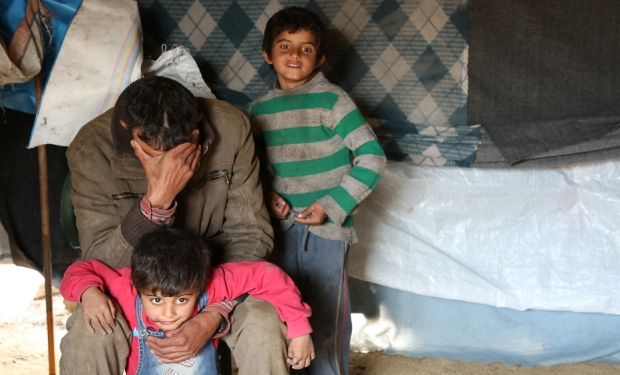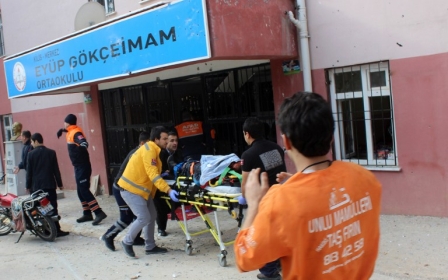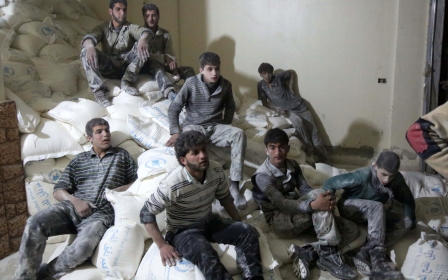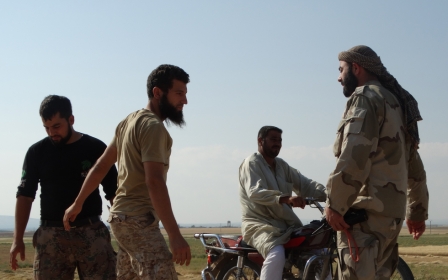Syrian children trapped in besieged areas 'forced to eat animal feed'
More than a quarter of a million children in Syria’s besieged zones are living in “terror,” regularly subjected to barrel bombs, air strikes and shelling, an aid group said on Wednesday.
According to a new report by Save the Children, at least 250,000 children lack access to food, clean water and medicine and have grown more “withdrawn, aggressive or depressed” as a result of the effects of the fighting.
“Children are living on the verge of death. They are forced to eat leaves – even flour and milk is forbidden to bring in,” Raed, an aid worker said.
The Childhood Under Siege report, based on extensive interviews with people in besieged areas, found that restrictions on access and fighting has worsened over the past six months. Many children are suffering from malnutrition and there are widespread reports of child deaths as a result of the sieges.
Families who tried to escape have reportedly been gunned down by snipers, which have trapped many Syrians in open-air prisons, Save the Children said.
“A relative’s infant son died from malnutrition because of the lack of formula and food for children. His mother wasn’t able to breastfeed him because she was in such poor health,” Um Tarek, a mother in Misraba, a Damascus suburb, told the aid group.
Hassan, a father who fled the eastern city of Deir Ezzor, said that he had desperately been trying to shield his family from the terror outside.
“When the shelling was happening my children were terrified … I saw four children that were hit by the bombs,” he said. “It was so tragic, I couldn’t even watch what was happening. Some children lost their limbs.”
Even when the bombs were not falling, the family faced a host of challenges.
“I used to lie to my children and tell them that the grass is edible. But who am I kidding? The grass wasn’t edible … I was convincing them that we bought it in order to eat it just like everyone else. I ate it in front of them so they would be convinced,” he said.
“I (watched) my kids losing weight every day and I wasn’t able to do anything. My children lost more than a quarter of their weight.”
Recent analysis by the Syrian American Medical Society (SAMS) found that of the 560 deaths surveyed, almost 50 percent of the casualties were children under 14 years old.
Many of these deaths were from preventable causes, including accidentally ingesting poison while scavenging for food, or a lack of emergency medical care, the organisation said.
“Children are dying from lack of food and medicines in parts of Syria just a few kilometres from warehouses that are piled high with aid. They are paying the price for the world’s inaction,” Save the Children CEO Tanya Steele said.
“Families interviewed for this report spoke of sick babies dying at checkpoints, vets treating humans and children forced to eat animal feed as they cower in basements from airstrikes. Enough is enough. After nearly five years of conflict in Syria, it’s time to end the sieges.”
Rihab, a mother in Eastern Ghouta, who spoke to the charity on the condition that her real name not be used, said that “fear has taken control”.
“Children now wait for their turn to be killed. Even adults live only to wait for their turn to die,” she said.
Eastern Ghouta is one of the 18 areas in Syria now deemed as besieged by the UN, although some aid groups put the figure significantly higher.
In early February, UN’s Office for the Coordination of Humanitarian Affairs (OCHA) said it believed 486,700 people were under siege, while monitoring network Siege Watch estimates it’s closer to one million people. NGO Doctors Without Borders (MSF) has put the figure as high as two million.
A hard-won ceasefire came into force late last month, with aid deliveries to besieged areas finally being allowed in, but violations are ongoing and aid groups have described aid delivery as “ad hoc” at best and have “often [been] stripped of vital supplies including medical equipment”.
Ahmed, a boy in Douma, said that he found it very difficult to forget about the fighting.
“When I hear the sound of a shell or a plane, then I get very afraid and I hurry to escape and hide under my bed,” he said.
New MEE newsletter: Jerusalem Dispatch
Sign up to get the latest insights and analysis on Israel-Palestine, alongside Turkey Unpacked and other MEE newsletters
Middle East Eye delivers independent and unrivalled coverage and analysis of the Middle East, North Africa and beyond. To learn more about republishing this content and the associated fees, please fill out this form. More about MEE can be found here.





